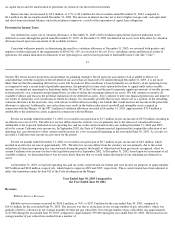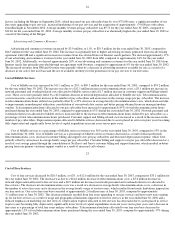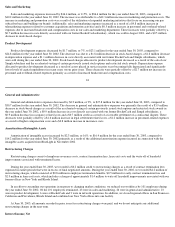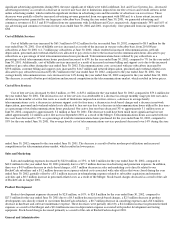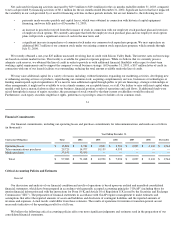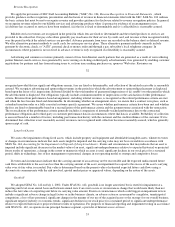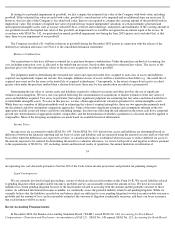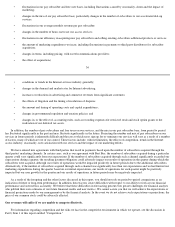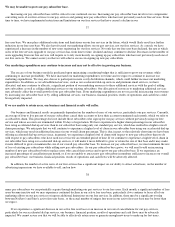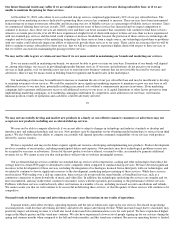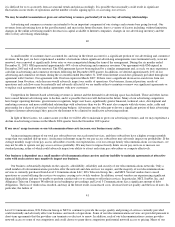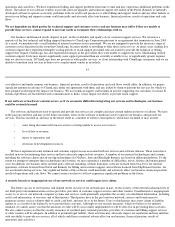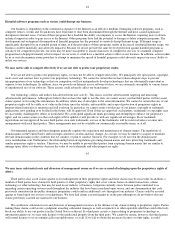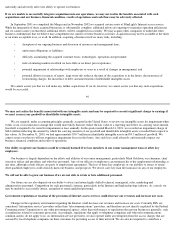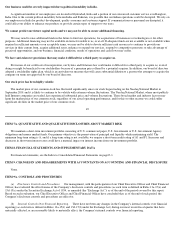Classmates.com 2003 Annual Report Download - page 28
Download and view the complete annual report
Please find page 28 of the 2003 Classmates.com annual report below. You can navigate through the pages in the report by either clicking on the pages listed below, or by using the keyword search tool below to find specific information within the annual report.
Compensation, to provide alternative methods of transition for an entity that voluntarily changes to the fair value-based method of accounting
for stock-based employee compensation. It also amends the disclosure provisions of SFAS No. 123 to require prominent disclosure about the
effects on reported net income of an entity's accounting policy decisions with respect to stock-based employee compensation. This Statement
also amends Accounting Principles Board ("APB") Opinion No. 28, Interim Financial Reporting, to require disclosure about those effects in
interim financial information. SFAS No. 148 is effective for annual and interim periods beginning after December 15, 2002. The adoption of
the interim disclosure provisions of SFAS No. 148 in the March 2003 quarter did not have any impact on our financial position, results of
operations or cash flows as we have elected not to adopt the fair value-based method of accounting for stock-based employee compensation.
In January 2003, the Emerging Issues Task Force ("EITF") issued EITF Issue No. 00-21, Accounting for Revenue Arrangements with
Multiple Deliverables
. This consensus addresses certain aspects of accounting by a vendor for arrangements under which it will perform
multiple revenue-generating activities, specifically, how to determine whether an arrangement involving multiple deliverables contains more
than one unit of accounting. EITF Issue No. 00-21 is effective for revenue arrangements entered into in fiscal periods beginning after June 15,
2003, or entities may elect to report the change in accounting as a cumulative-effect adjustment in accordance with APB Opinion No. 20,
Accounting Changes,
and SFAS No. 3, Reporting Accounting Changes in Interim Financial Statements, with early application of this
consensus permitted. The adoption of EITF Issue No. 00-21 in the September 2003 quarter did not have any impact on our financial position,
results of operations or cash flows.
In January 2003, the FASB issued Interpretation ("FIN") No. 46, Consolidation of Variable Interest Entities . Until this interpretation, a
company generally included another entity in its consolidated financial statements only if it controlled the entity through voting interests. FIN
No. 46 requires a variable interest entity, as defined, to be consolidated by a company if that company is subject to a majority of the risk of loss
from the variable interest entity's activities or entitled to receive a majority of the entity's residual returns. FIN No. 46 is effective for reporting
periods ending after December 15, 2003. The adoption of FIN No. 46 in the December 2003 quarter did not have any impact on our financial
position, results of operations or cash flows.
In May 2003, the FASB issued SFAS No. 150, Accounting for Certain Financial Instruments with Characteristics of both Liabilities and
Equity
. SFAS No. 150 changes the accounting guidance for certain financial instruments that, under previous guidance, could be classified as
equity or "mezzanine" equity by now requiring those instruments to be classified as liabilities (or assets in some circumstances) on the balance
sheet. Further, SFAS No. 150 requires disclosure regarding the terms of those instruments
35
and settlement alternatives. SFAS No. 150 is generally effective for all financial instruments entered into or modified after May 31, 2003, and
is otherwise effective at the beginning of the first interim period beginning after June 15, 2003. The adoption of SFAS No. 150 in the
September 2003 quarter did not have any impact on our business, financial position, results of operations or cash flows.
In December 2003, the SEC issued SAB No. 104. This staff accounting bulletin revises or rescinds portions of the interpretative guidance
included in Topic 13 of the codification of staff accounting bulletins in order to make this interpretive guidance consistent with current
authoritative accounting and auditing guidance and SEC rules and regulations. This staff accounting bulletin also rescinds the Revenue
Recognition in Financial Statements Frequently Asked Questions and Answers document issued in conjunction with Topic 13. Selected
portions of that document have been incorporated into Topic 13. The adoption of SAB No. 104 in the December 2003 quarter did not have any
impact on the Company's financial position, results of operations or cash flows.
Inflation
We do not currently anticipate that inflation will have a material impact on our results of operations.
RISK FACTORS
Before deciding to invest in our company or to maintain or increase your investment, you should carefully consider the risks described
below as well as the other information in this report and our other filings with the SEC. The risks and uncertainties described below are not the
only ones facing our company. Additional risks and uncertainties not presently known to us or that we currently deem immaterial may also
affect us. If any of these risks actually occur, our business, financial position, results of operations and cash flows could be adversely impacted.
In that event, the market price of our common stock could decline and you may lose all or part of your investment.
Our business is subject to fluctuations.
Our results of operations have varied in the past and may fluctuate significantly in the future due to a variety of factors, many of which are
outside our control and difficult to predict. The following are some of the factors that may affect us from period to period and may affect our
long-term performance:
• changes to service offerings and pricing by us or our competitors;


